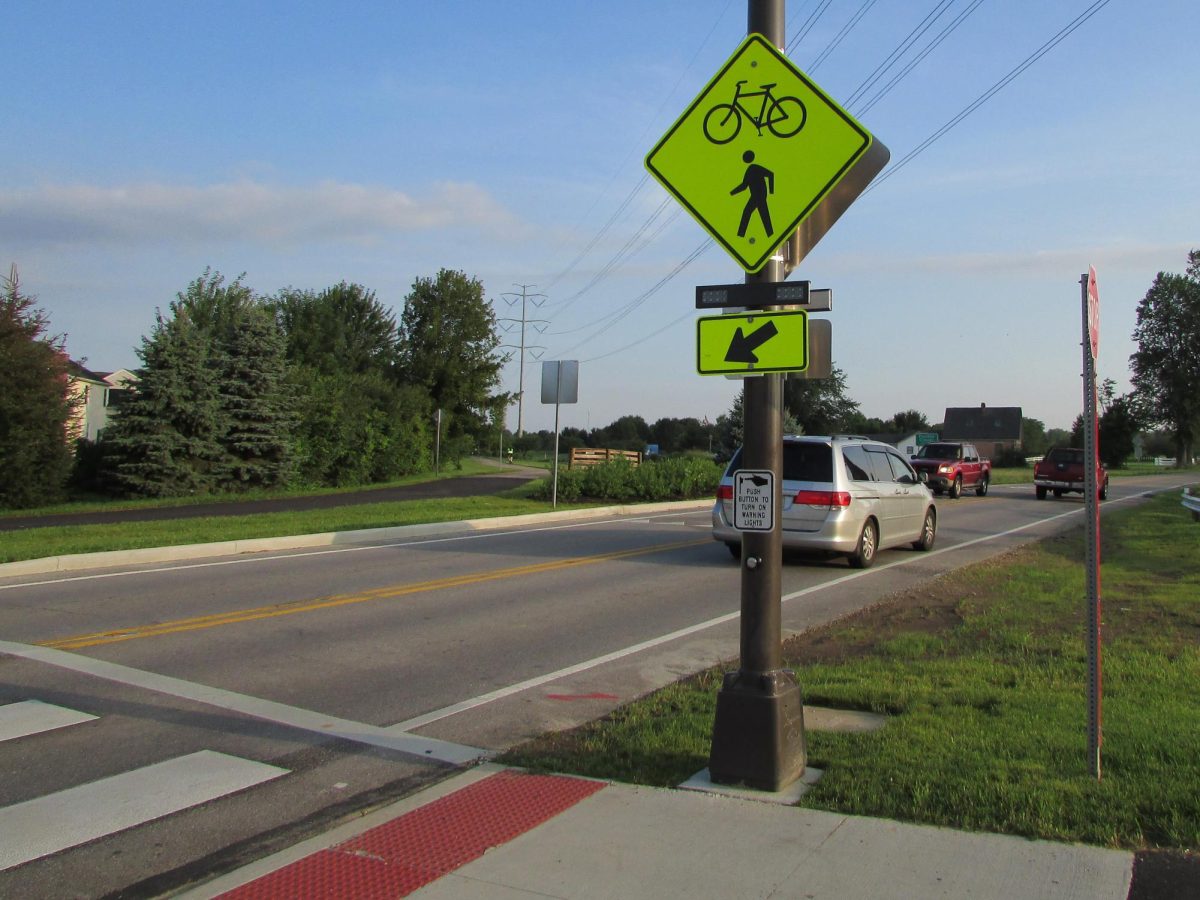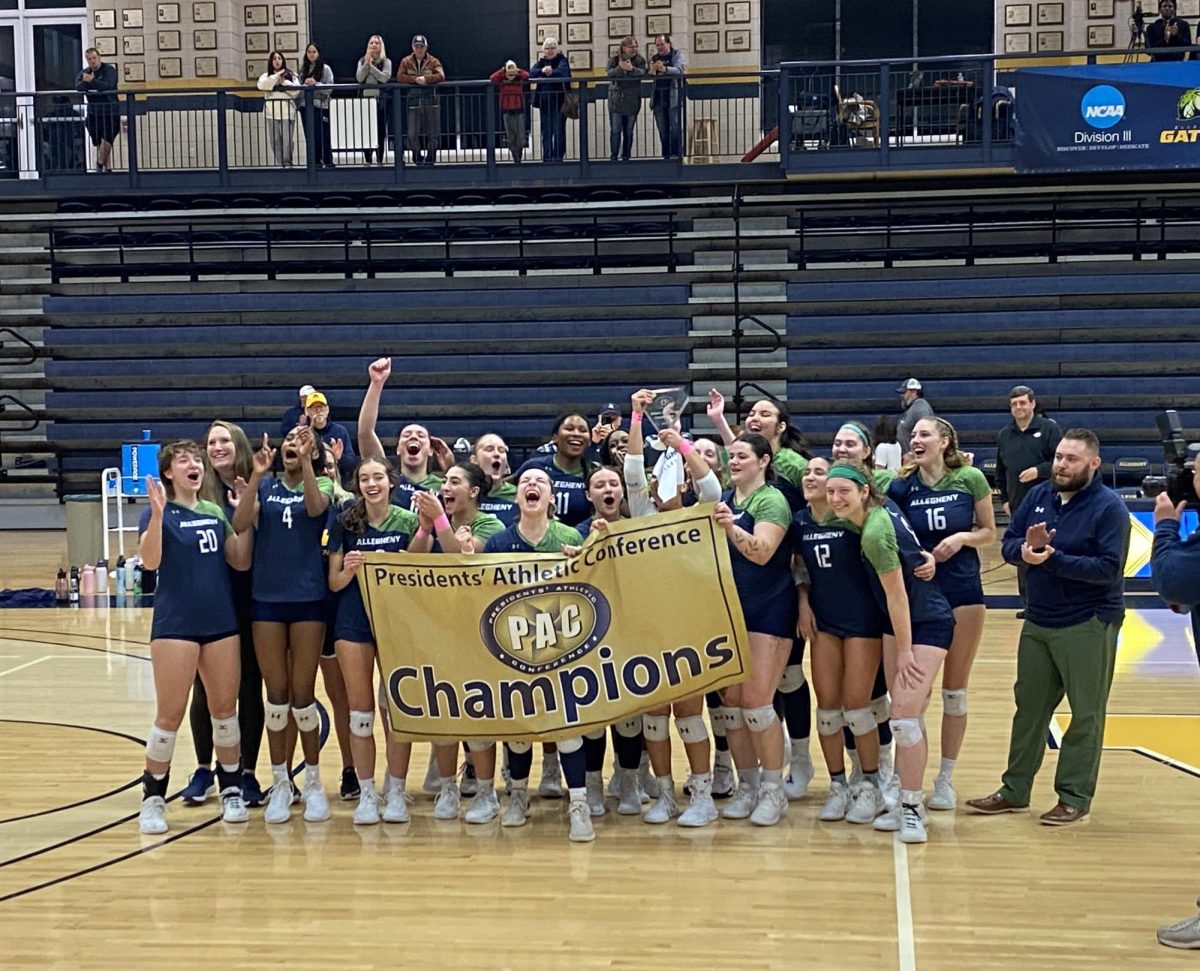Title: Assistant Professor of Music, Director of Choral Activities
Graduated from: Allegheny College, class of 1997
M.M. from Binghamton University
D.M.A. from University of Connecticut
Samantha: Where are you originally from?
Niblock: I’m from New York; I grew up about 70 miles north of New York City when it was less suburban than it is now. So I grew up around farms and living out in the country.
S: At what point did you realize that you wanted to be in music?
N: Well, I spent the better part of two years as an environmental science major here at Allegheny. And I enjoyed those things, but was not really drawn into them in quite the same way as I was with music. And so when I started out, I was taking primarily science courses, all of the same courses that students complain about now. When I was taking Chem 111 and Bio 212 and those sorts of things, I was also taking a music class as an elective and I was singing in all the choirs and playing in both the Wind Symphony and the Wind Ensemble, and I was taking voice and piano lessons.
So all of those things, you know, you sort out what your affinities are and what satisfies you the most. And at a certain point I just decided that music was really a better path for me.
S: If I can remember correctly, you’ve guest conducted here a few times?
N: That’s right, I always tried to keep my Allegheny connections alive. This is the place that brought me to my career and to my wife. I visited a lot – my wife’s family lives outside of Meadville, so we came here a lot to visit her family and friends, and that kept us in contact with lots of Allegheny stuff too.
S: Did you have Jamison [Ward Jamison, former director of choral activities] when you were here?
N: Yes I did, he was my choir director and my conducting teacher. And I took theory classes with him, independent studies with him. We’ve kept in really close touch as I’ve gone through my schooling and various points in my career.
S: Did they call Jamison “Chief” when you were in school?
N: Yes, yes they did.
S: So how is the transition between you and Chief going? I see that he’s still in the other room teaching?
N: Yes, he’s filling in for Vicki [Instructor of Voice Vicki Jamison]. He is anxious to be helpful but also not to be a looming fixture over my shoulder. He and Vicki have been so supportive about keeping things moving forward for the students; I think all of us have that in mind. We all want to see the very best parts of what has grown out of the tradition of singing here, and we want to see all of those best things continue into the future. So I think it’s been really helpful, actually, to be working on that transition process with someone that you know well and that you have a mutual understanding with.
S: How have your first few weeks of classes gone?
N: The first few weeks have gone really well. I spent most of July here trying to get my office put together and trying to get the choir room sorted out. Because there’s a big program that surrounds my teaching responsibilities, there’s a lot of equipment and materials, music and so forth, that I need to have some familiarity with and know where things are and be able to operate the equipment in the room.
S: Like that crazy electric piano?
N: Yeah, all sorts of things – even little things like when does the piano get tuned and what happens when someone unplugs the piano and it’s been unplugged for three days. But the transition has been really good, as I said, I spent a lot of time here getting ready for students to actually come back and see that I was different and that certain things might be different, but that continuity was going to be there.
So the first couple of weeks have been great. Number one, for having someone who was very cooperative in the transition phase and number two, for having done a lot of work before that transition actually went public, so to speak, and number three, because the students are invested in making it work and making it go forward.
It’s not like a calculus class where from one semester to another there is no continuity between those classes – you hope there’s no continuity because anyone who’s taking that class over isn’t really excited about it – whereas in this curriculum, you hope that lots of students are continuing in the same ensembles or continuing with voice lessons.
One of the best signs about the transition is that there were very few students that have not returned. You have the usual rate of scheduling conflicts and so on, but the really high rate of returning students is a really great sign of what’s going on.
S: So far, what’s your favorite part about being back at Allegheny?
N: I think my favorite part of what Allegheny is in the first place is that it’s a place about people. It’s about interactions and relationships and that’s really exciting. And so, for all the things that I feel nostalgic about – my wife and I got married in Ford Chapel, I was a first-generation college graduate – there are lots of things that I could be sentimental and nostalgic about.
But first and foremost, I think that the whole nature of this place is defined by the fact that it’s about people and offering new opportunities to students, making them better as scholars, as citizens, all of that. It sounds a little cliche when you’re hashing it out verbally; it sounds like what’s written in brochures in every admissions office in America.
But it’s really fun, also, to reconnect with people that I know here. Obviously, I’m working closely with some of my former teachers, it’s really fun to be working in the department that gave so much to me. Luckily none of my students remind me of me, they’re much more industrious than I was when I was a student.
S: When did you first hear about the job listing?
N: Jobs are circulated by professional association newsletters, so I had known for a while that Ward would be retiring but you don’t know how the school’s going to post the job and you don’t know if you’ll be a good fit. And so, there was a long time period there when I knew Ward would retire but I didn’t know if I would apply for the job or if I would fit the kind of responsibilities that they had in mind.
It’s a really delightful and remarkable set of circumstances that have worked out for me to come back here. […] My job is so particular that the only real central tenant of the job is directing the choirs. So obviously I had made it past that hurdle, being a choir director, but then how do all the other pieces fit together, that sort of people magic is really important at a place like Allegheny.
S: Where else did you work in the interim between being here and being at school?
N: When I left Allegheny, I went to grad school for two years for my master’s degree and I taught high school for two years in Cleveland. And then I went back again and got my doctoral degree, and for the past seven years, I’ve been teaching at Colgate University in upstate New York. So that’s actually closer to home for me, but I’m really thrilled to be back here.
S: Since you are a music professor, I have to ask you what your favorite genre, and possibly your favorite composer is?
N: I’ll give you a non-answer, it’s pretty vague. But, I’m really fond of the storytelling aspect of music, and so that influences the type of music that I like in every genre. So when it comes to classical choral music I love arrangements of folk tunes from all around the world, because different cultures and different heritages have very different stories that they think are interesting.
While we might think that a story of unrequited love is sort of “Of course! That’s what songs are all about. I love her and she doesn’t love me back.” Not all cultures are like that. I’ve done a few concert programs in my career where all of the pieces are about people. They use people’s names and they refer to specific characters.
But that’s also true of my taste in popular music. I love sort of, singer-songwriter folk. Everyone from John Denver to Billy Joel, Roger Miller. I love sea shanties and folk tunes. But, yeah, I’m kind of all over the map. I grew up with my parents listening to a lot of country music, my brothers listened to heavy metal, and pretty much everything in between too.
S: Is there anything that you hope to achieve with the choirs in the upcoming years?
N: Keeping the wheels on the cart is definitely first priority. I do want the choirs to have the sense that some new things are over the horizon. And so, it’s really difficult to pin down in the first two weeks what those things will be, but I hope – my own personal hope, whether they jive with Allegheny’s hopes or student’s hopes – is that the choirs will have a chance to do a little bit more outreach. To interact with the community and to be out in public schools doing some singing. Or traveling on tour. Singing with alumni, those kinds of things.
So that’s my foremost goal. And I’m trying to mix things up, just a little bit, just so it still feels like the same program but a different day. The choirs will sing a bit more accompanied music, I’m very fortunate to have some very good pianists playing for my rehearsals, including Chief and two local organists from the presbyterian and methodist churches downtown. So it’s all exciting stuff.
S: Is there anything else you’d like to say to the Allegheny community?
N: I guess two things, the first being that I love the level of interest that people have in singing here, and I think it’s a really great and central part of the campus. And I think it is a special part of Allegheny, and I’m saying that now in my second week that I clearly didn’t make it that way. It just is that way. That was really clear at the alumni choir reunion this summer […] there were over 300 people there. So that is a really special part of working here. It’s sort of a fun thing for me to be part of the alumni body here as well as the teaching body.
The second thing goes back to my point about this being a people place. I’m really grateful to be here in a place that is about the relationships between students and faculty and the faculty across departments. To be coming back to a place that is warm and people-oriented and concerned with that aspect of education, that part of the college experience. It’s not just about tacking lines on your resume but developing these sort of connections and insights, and learning the craft of other people’s experiences, not just the craft of learning calculus or understanding economics, but learning what you can take away from another person’s experience.




